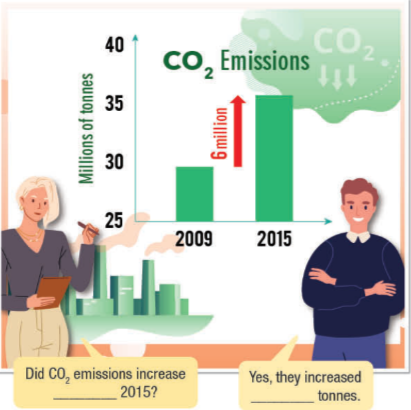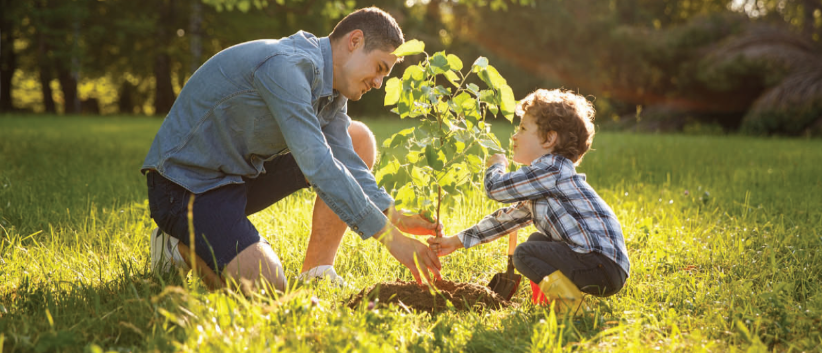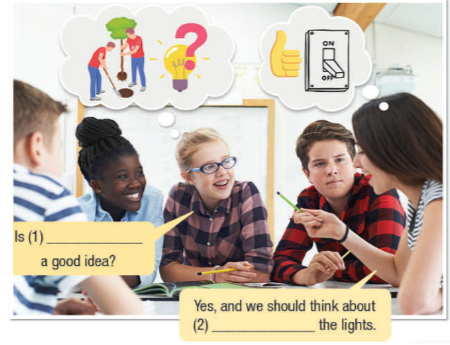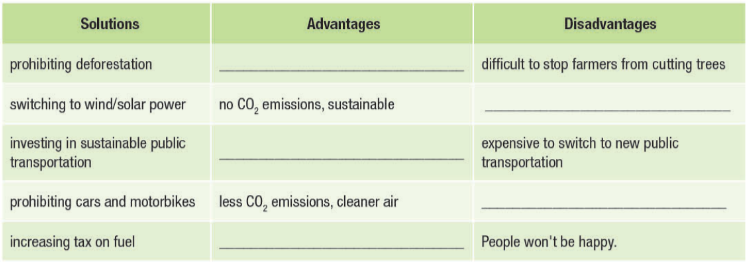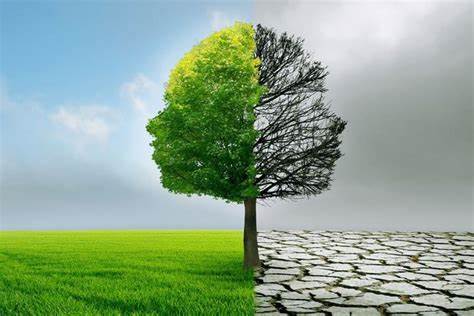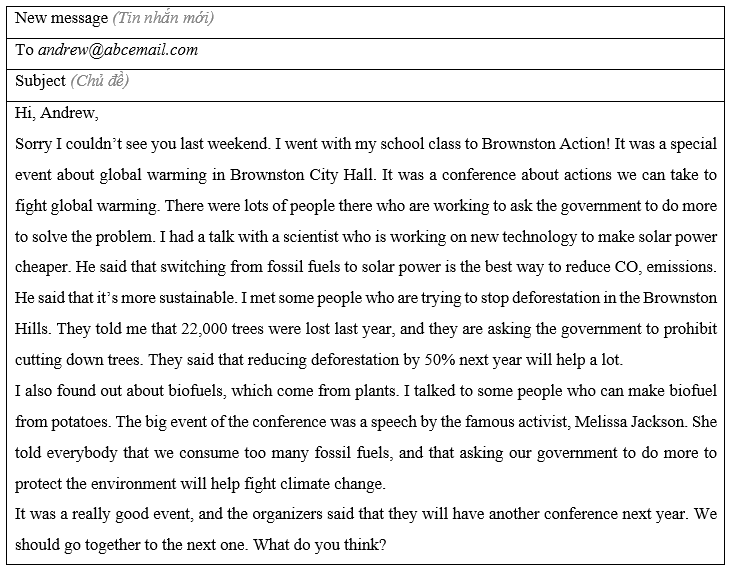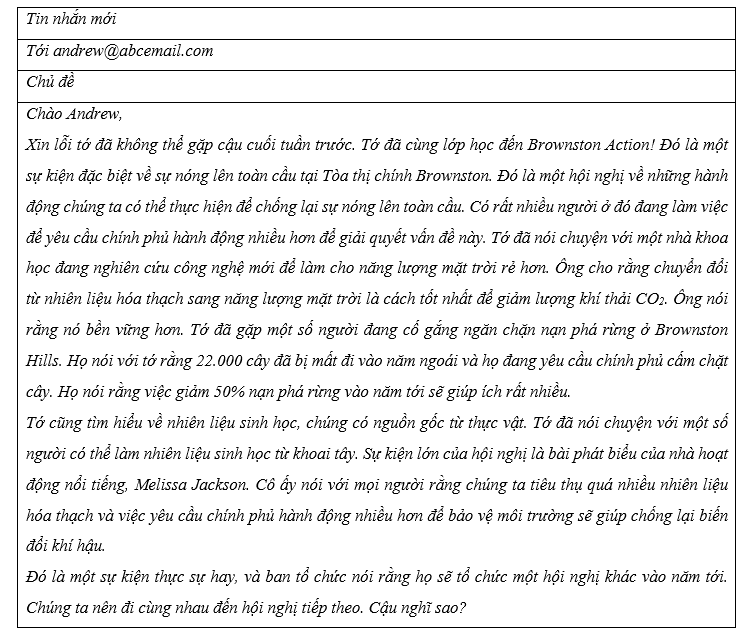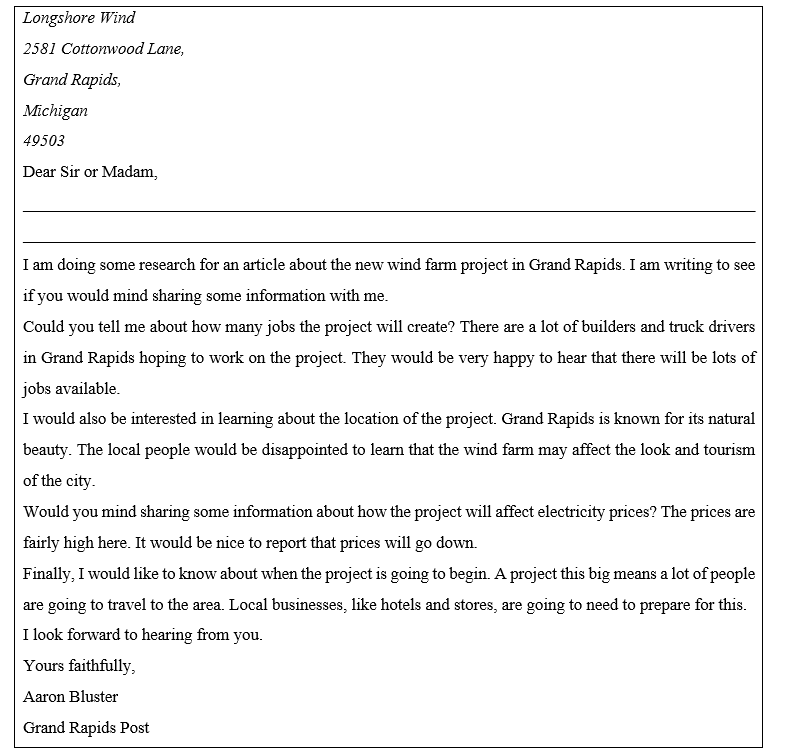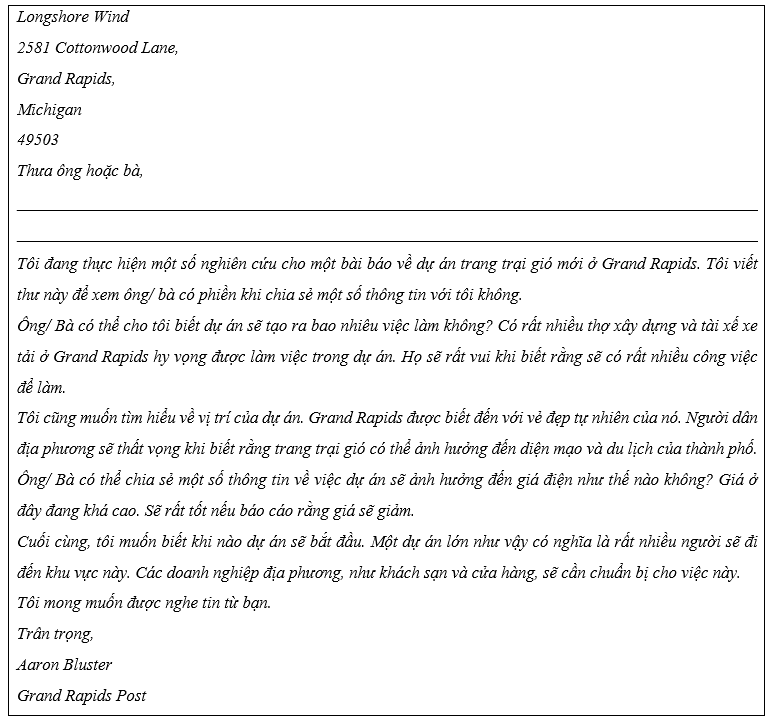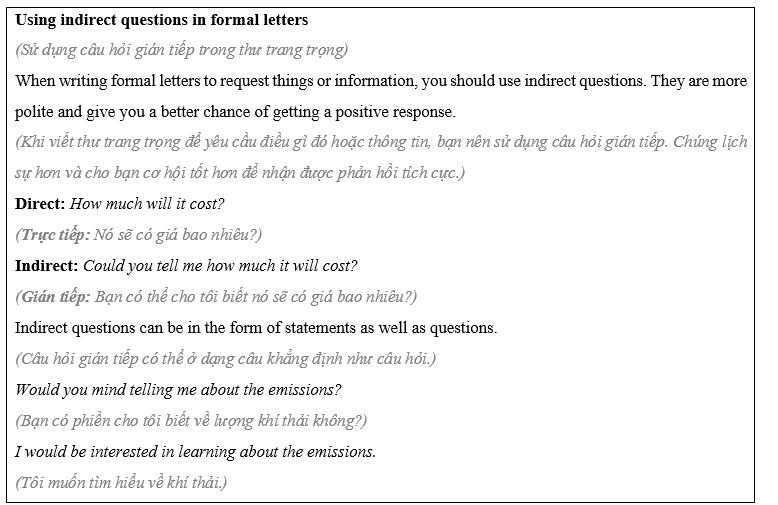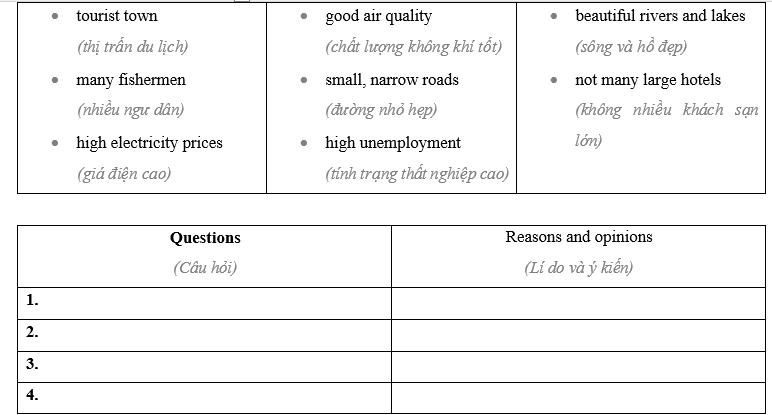Giải SGK, SBT Unit 4. Global Warming iLearn Smart World
Giải SGK, SBT Unit 4 iLearn Smart World
a. Match the underlined words to the definitions. Listen and repeat.
(Nối các từ được gạch chân với các định nghĩa. Lắng nghe và lặp lại.)
|
1. Fossil fuels are one of the main ways we get electricity. 2. Global warming has caused the Earth to get hotter. 3. The forest is getting smaller by fifty thousand hectares a day. 4. Billions of tonnes of plastics are released into the ocean every year. 5. The air quality in the city is really bad because of the emissions from traffic and factories. 6. Approximately 2,400 trees are cut down. every minute. 7. Carbon dioxide in the atmosphere has reached dangerously high levels. |
a. a unit of weight-one of these is the same as one thousand kilograms. b. types of energy like gas, oil, and coal c. an area which is the same as ten thousand square meters d. the increase in Earth's temperature because of more greenhouse gases in the air e. gas (also known as CD) which comes from humans, animals, and burning trees and coal. f. gas or smoke which goes into the air and damages the environment g. near or close to a number or amount |
b. Now, listen and complete the table.
(Bây giờ, lắng nghe và hoàn thành bảng.)
|
South Korea CO2 emissions (millions of tonnes) |
|
|
1971 |
(1) _______________ |
|
(2) _______________ |
480 |
|
2016 |
600 |
|
Global deforestation (millions of hectares) |
|
|
(3) _______________ |
3 |
|
2016 |
(4) _______________ |
|
2020 |
(5) _______________ |
c. Read the Conversation Skill box. Then, listen and repeat.
(Đọc hộp Kỹ năng đàm thoại. Sau đó, nghe và lặp lại.)
|
Conversation Skill: (Kỹ năng đàm thoại) Asking for repetition (Yêu cầu lặp lại) We can ask the other speaker to repeat something by saying: (Chúng ta có thể yêu cầu người khác lặp lại điều gì đó bằng cách nói) Sorry, how much? (Xin lỗi, bao nhiêu?) (Sorry,) Can you say that again? ((Xin lỗi,) Bạn có thể nói lại lần nữa không?) |
Point, ask, and answer.
(Chỉ, hỏi và trả lời.)
Did CO2 emissions increase from 2016 to 2017?
(Lượng khí thải CO2 có tăng từ năm 2016 đến năm 2017 phải không?)
Yes. They increase from two hundred thousand to approximately three hundred thousand tonnes.
(Đúng. Chúng tăng từ hai trăm nghìn lên xấp xỉ ba trăm nghìn tấn.)
Did deforestation increase from 2019 to 2020?
(Phá rừng có tăng từ 2019 đến 2020 phải không?)
Yes. It rose by approximately one hundred thousand hectares.
(Đúng. Nó đã tăng khoảng một trăm nghìn ha.)
|
|
2016 |
2017 |
2018 |
2019 |
2020 |
|
CO2 emissions (tonnes) (Lượng khí thải CO2 (tấn)) |
200,000 |
300,000 + 100,000 |
350,000 + 50,000 |
380,000 + 30,000 |
500,000 + 120,000 |
|
Deforestation (hectares) (Phá rừng (hecta)) |
550,000 |
500,000 - 50,000 |
620,000 + 12,00 |
590,000 - 30,000 |
700,000 + 110,000 |
a. Match the underlined words with the definitions. Listen and repeat.
(Nối các từ được gạch chân với các định nghĩa. Lắng nghe và lặp lại.)
|
1. Governments should prohibit farmers from destroying forests to stop deforestation. 2. We can switch from oil to solar power. 3. Governments should increase the tax on gas to make it more expensive. 4. Biofuels are much cleaner than fossil fuels. 5. If we continue to consume fossil fuels, global warming will get worse. 6. Wind and solar energy are more sustainable than fossil fuels. |
a. use something, usually in large amounts b. energy made from living things c. part of the money that we earn or spend, which goes to the government d. stop something by using a rule or law e. change to something different f. using natural products and energy that doesn't damage the environment |
c. Listen and circle the words you hear.
(Nghe và khoanh tròn những từ bạn nghe được.)
|
1. fossil 2. recycles 3. spends |
fossils recycled spells |
a. Practice the conversation. Swap roles and repeat.
(Thực hành các cuộc đối thoại. Đổi vai và lặp lại.)
Tom: What's the best way to stop global warming?
(Cách tốt nhất để ngăn chặn sự nóng lên toàn cầu là gì?)
Liz: Hmm. I'm not sure. Is switching to solar power a good idea?
(Hừm. Tôi không chắc. Chuyển sang năng lượng mặt trời là một ý tưởng tốt?)
Tom: I think it would be too expensive.
(Tôi nghĩ nó sẽ quá đắt.)
Liz: OK. Would prohibiting cars in city centers be a better solution?
(Được rồi. Liệu cấm ô tô trong trung tâm thành phố có phải là một giải pháp tốt hơn?)
Tom: I think so. It will reduce CO2 emissions.
(Tôi nghĩ vậy. Nó sẽ làm giảm lượng khí thải CO2.)
Liz: Maybe you're right. I think using clean public transportation might be a good solution.
(Có lẽ bạn nói đúng. Tôi nghĩ rằng sử dụng phương tiện giao thông công cộng sạch có thể là một giải pháp tốt.)
Tom: I'm not so sure. Switching to electric buses. will be very expensive.
(Tôi không chắc lắm. Chuyển sang xe buýt điện. sẽ rất tốn kém.)
|
asking people to save electricity (bảo mọi người tiết kiệm điện) |
using wind power (sử dụng năng lượng gió) |
|
difficult to do (khó để làm) |
too unreliable (quá không đáng tin cậy) |
|
increasing tax on fuel (tăng thuế nhiên liệu) |
increasing the price of cars and motorbikes (tăng giá xe ô tô và xe máy) |
|
I don’t think so. It will make people angry. (Tôi không nghĩ vậy. Nó sẽ làm mọi người tức giận.) |
I don’t think so. It won’t stop people from buying them. (Tôi không nghĩ vậy. Nó sẽ không ngăn cản được việc mọi người mua chúng.) |
|
using electric cars (sử dụng ô tô điện) |
riding bicycles to work (đi xe đạp đi làm) |
|
They’re too expensive to buy for some people. (Với một số người chúng quá đắt tiền để mua.) |
Riding bicycles is dangerous in some countries. (Đạp xe nguy hiểm ở một số nước.) |
a. Read about using indirect questions in formal letters. Then, read William's letter again and underline the indirect questions.
(Đọc về cách sử dụng câu hỏi gián tiếp trong thư trang trọng. Sau đó, đọc lại bức thư của William và gạch dưới những câu hỏi gián tiếp.)
|
Writing Skill (Kĩ năng viết) Using indirect questions in formal letters (Sử dụng câu hỏi gián tiếp trong thư trang trọng) When writing formal letters to request things or information, you should use indirect questions. They are more polite and give you a better chance of getting a positive response. (Khi viết thư trang trọng để yêu cầu điều gì đó hoặc thông tin, bạn nên sử dụng câu hỏi gián tiếp. Họ lịch sự hơn và cho bạn cơ hội tốt hơn để nhận được phản hồi tích cực.) Direct: How much will it cost? (Trực tiếp: Nó sẽ có giá bao nhiêu?) Indirect: Could you tell me how much it will cost? (Gián tiếp: Có thể cho tôi biết nó sẽ có giá bao nhiêu?) Indirect questions can be in the form of statements as well as questions. (Câu hỏi gián tiếp có thể ở dạng câu khẳng định cũng như câu hỏi.) Would you mind telling me about the emissions? (Bạn có phiền cho tôi biết về lượng khí thải không?) I would be interested in learning about the emissions. (Tôi sẽ quan tâm đến việc tìm hiểu về lượng khí thải.) |
a. You're a reporter researching for an article about projects to reduce global warming. In pairs: Look at the energy projects below. Discuss what information you would like to know about each of them. You can use the prompts to help you. Discuss why you want to know each piece of information.
(Bạn là một phóng viên đang nghiên cứu cho một bài báo về các dự án nhằm giảm sự nóng lên toàn cầu. Theo cặp: Nhìn vào các dự án năng lượng dưới đây. Thảo luận về những thông tin bạn muốn biết về mỗi người trong số họ. Bạn có thể sử dụng lời nhắc để giúp bạn. Thảo luận về lý do tại sao bạn muốn biết từng mẩu thông tin.)
I would like to know what the wind farm will look like.
(Tôi muốn biết trang trại gió sẽ trông như thế nào.)
Why?
(Tại sao?)
Because it is a tourist town. Fewer people might travel there if it is ugly.
(Bởi vì nó là một thị trấn du lịch. Ít người có thể đi du lịch ở đó nếu nó là xấu.)
time? (thời gian?)
cost? (trị giá?)
jobs? (việc làm?)
pollution? (sự ô nhiễm?)
appearance? (vẻ bề ngoài?)
electricity prices? (giá điện?)
noise? (tiếng ồn?)
|
Nuclear power station in Mensfield (Nhà máy điện hạt nhân ở Mensfield) Mensfield: - crowded city (thành phố đông đúc) - high unemployment (tỷ lệ thất nghiệp cao) - bad air quality (chất lượng không khí kém) - few open areas (vài khu vực mở) - many office buildings (nhiều tòa nhà văn phòng) - high electricity prices (giá điện cao) |
Wind farm off the coast of Chapstow (Trang trại gió ngoài khơi Chapstow) Chapstow: - tourist town (thị trấn du lịch) - many fishermen (nhiều ngư dân) - good air quality (chất lượng không khí tốt) - beautiful beaches (bãi biển đẹp) - very quiet and peaceful (rất yên tĩnh và thanh bình) - low electricity prices (giá điện thấp) |



